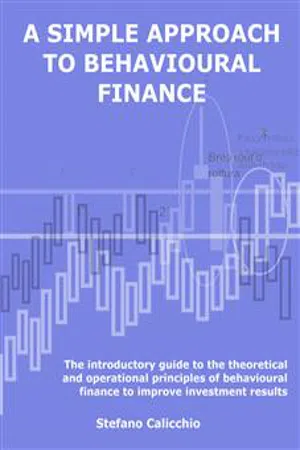
A simple approach to behavioural finance
The introductory guide to the theoretical and operational principles of behavioural finance to improve investment results
- English
- ePUB (mobile friendly)
- Available on iOS & Android
A simple approach to behavioural finance
The introductory guide to the theoretical and operational principles of behavioural finance to improve investment results
About this book
What is behavioural finance and how does it work? How can it help investors achieve better performance? Why has it become so important in recent years? Quickly learning the basics of behavioural finance and applying it to your own investments has never been easier. For the first time, a comprehensive and accessible guide shows you the theoretical and operational principles of the subject. Within this practical handbook you will discover all the information you need to truly understand how psychology and the study of human behaviour has embraced the world of economics and finance. The reader will learn step by step how to confront the new theories of behavioural economics without hesitation. You will discover through direct information and essential strategies that can broaden your view of financial markets, how they work and the applications for managing your investments.
Frequently asked questions
- Essential is ideal for learners and professionals who enjoy exploring a wide range of subjects. Access the Essential Library with 800,000+ trusted titles and best-sellers across business, personal growth, and the humanities. Includes unlimited reading time and Standard Read Aloud voice.
- Complete: Perfect for advanced learners and researchers needing full, unrestricted access. Unlock 1.4M+ books across hundreds of subjects, including academic and specialized titles. The Complete Plan also includes advanced features like Premium Read Aloud and Research Assistant.
Please note we cannot support devices running on iOS 13 and Android 7 or earlier. Learn more about using the app.
Information
A short introductory test to behavioural finance
| Question | Yes | No |
| They are aware of the relationships that exist between individual psychology and the results that can be achieved in investments. | | |
| I know the concept of risk and I am aware of how to manage it. | | |
| I understand why people often make bad financial decisions. | | |
| I understand why the market can be inefficient at times. | | |
| I know how to manage emotions in the financial field. | | |
| I understand the impact of emotions on my investment decisions. | | |
| I know the bìas and errors of judgement that typically affect investors when managing market positions. | | |
| I establish investment plans consistent with my objectives. | | |
| I am aware of my expectations with regard to the return I can get from the market. | | |
| I understand investors' prejudices and the consequences they have on investments. | | |
| Use of investment management techniques that also take into account psycholog... |
Table of contents
- Cover
- A SIMPLE APPROACH TO BEHAVIOURAL FINANCE
- Table of contents
- Introduction
- What is behavioural finance
- A short introductory test to behavioural finance
- Why it is important to know about behavioural finance
- Understanding irrational investor behaviour
- The theory of efficient markets and attempts to beat the market
- Analysing irrational behaviour and going beyond traditional theory
- The profile of the successful investor
- Irrational behaviour and overconfidence
- The herd factor
- Presumption and repentance
- Aversion to defeat
- Sunk costs and the discrepancy with reality
- Issues relating to judgement
- The cognitive errors behind speculative bubbles
- Managing emotionality and avoiding self-inflicted traps
- Making friends with risk
- The operating principles of behavioural finance
- Defending yourself against yourself
- Savings and behavioural finance
- The time factor and the psychological impact of the long-term horizon
- Key points of behavioural finance
- Conclusions
- Final test
- Solutions